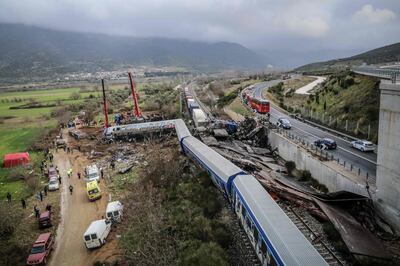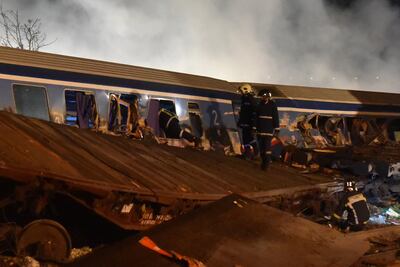A station master has been arrested after two trains collided head-on in Greece, killing at least 43 people and injuring 85 on Tuesday night.
Three carriages skipped the tracks shortly before midnight after the trains — one carrying freight, the other 350 passengers — collided halfway between Athens and Thessaloniki.
The crash occurred as the passenger train emerged from a tunnel.
The cause of the accident, the deadliest in the country’s rail history, is not clear.
Eight rail employees were among those killed, including the two drivers of the freight train and the two drivers of the passenger train, according to Greek Railroad Workers Union President Yannis Nitsas.
Greece's firefighting service on Wednesday said 66 people had been admitted to hospital, including six in intensive care.
The death toll is expected to rise.
On Wednesday police arrested the station master, 59, of the nearby central Greek city of Larissa. He was charged over causing mass deaths, and with causing grievous bodily harm, through negligence, a police official said.
The man denied any wrongdoing and attributed the accident to a possible technical failure, the official added.
Another two people have been detained for questioning.
Greece's supreme court prosecutor had earlier ordered an investigation. Government spokesman Yiannis Economou said the trains were running on the same track for “several kilometres”.
On Wednesday, Greek President Katerina Sakellaropoulou said she was cutting short a visit to Moldova to return to Greece after the crash.
She announced her decision at a news conference in Moldova.
Konstantinos Agorastos, the regional governor of the Thessaly area, told Greece’s Skai Television that the two trains had collided head-on at high speed.
“Carriage one and two no longer exist and the third has derailed,” he said.
The trains crashed just before the Vale of Tempe, a gorge that separates the regions of Thessaly and Macedonia.
The impact caused a fire in several carriages, burning many commuters who were taken to hospital.
Hospital officials in Larissa said at least 25 people had serious injuries.
“We heard a big bang, it was 10 nightmarish seconds,” passenger Stergios Minenis, 28, who jumped to safety from the wreckage, told Reuters.
“We were turning over in the wagon until we fell on our sides, then there was panic, cables, fire. The fire was immediate — as we were turning over, we were being burnt; fire was right and left.”
Vassilis Polyzos, a local resident who said he was one of the first people on the scene, said there were many large pieces of steel littered around.
"The trains were completely destroyed, both passenger and freight," he said.
He said dazed and disoriented people were escaping from the train's rear carriages as he arrived.
“People, naturally, were scared — very scared,” he said. “They were looking around, searching; they didn't know where they were.”
About 250 passengers were taken safely to Thessaloniki on buses. One passenger told state broadcaster ERT he managed to escape after breaking a window with his suitcase.
“There was panic in the carriage, people were screaming,” a young man said.
Angelos Tsiamouras, another passenger, told ERT that “it was like an earthquake”.
Broadcaster Skai showed footage of thick smoke emanating from badly damaged derailed carriages with broken windows, as well as debris strewn across the road.
Rescue workers carrying torches looked for trapped passengers inside the wreckage and also searched surrounding fields.

“The evacuation of passengers is under way in very difficult conditions, given the severity of the collision of the two trains,” fire brigade spokesman Vassilis Varthakogiannis said.
He said hospital units used to treat burn victims had been alerted and dozens of ambulances were involved in the rescue effort.
Survivors said several passengers were thrown through the windows of the train carriages by the impact.
Others fought to free themselves after the passenger train buckled, ploughing into a field next to the tracks.
“We are living through a tragedy. We are pulling out people alive, injured … [then] there are [the] dead,” a volunteer rescue worker told ERT state broadcaster.
“We are going to be here all night, until we finish, until we find the last person.”

Passengers who had minor injuries or were unharmed were taken by bus to Thessaloniki, 130km to the north. Police took their names as they arrived, in an effort to track those missing.
A teenage survivor who did not give his name told Greek reporters that shortly before the crash, he felt a strong braking and saw sparks before the train came to a sudden stop.
“Our carriage didn’t derail, but the ones in front did and were smashed,” he said, visibly shaken.
He said the first carriage caught fire and that he used a bag to break the window of his carriage, the fourth, and escape.
'A terrible night'
Rail operator Hellenic Train said the northbound passenger train from Athens to Thessaloniki, Greece's second-largest city, had about 350 passengers on board.
Officials said the army had been contacted to assist.
Hellenic Train is operated by Italy's FS Group, which runs rail services in several European countries.
— With reporting from agencies















